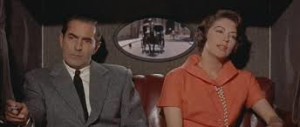Oops, I lied again.

Tyrone Power and Ava Gardner in the movie version of “The Sun Also Rises”
I promised we’d get into the Seven Principles of using your real life in fiction. But again I’m gonna jump forward to a critical corollary:
Don’t be afraid to fictionalize.
I used to be. I thought if I made stuff up, that would be lying. Being untrue to real life.
I would read Henry Miller and Ernest Hemingway and think, “See, they’re telling the truth! Everything they’re writing is real! That’s why it works! That’s what I’ve gotta do!”
Of course they were fictionalizing.
They were exaggerating.
They were heightening reality.
The trick was they were doing it so skillfully, I couldn’t tell. You mean Henry Miller didn’t really do that thing with the carrot in the doorway in Brooklyn?
Even if he did, who cares?
The truth is not the truth.
Fiction is the truth.
Remember, going back to our first principle of using your real life in fiction:
Make the internal external.
Why do we as writers do this? To involve the reader. In my real life, during the era of The Knowledge, I was allowing my inner demons of guilt, regret, and self-loathing to keep me from coming together as a real working writer.
The reader is not going to sit still for that.
It’s too interior.
It’s too bornig.
The answer:
Make sh*t up.
Was I really beaten up by gangsters at three in the morning in the wetlands near Glen Island Casino? Was my boss Marvin Bablik really honored with a gala at the Waldorf-Astoria? Did my wife really fire seven shots from a nickel-plated .45 into the rear end of a vehicle loaded with Haitian assassins?
No, but all of those actions were on-theme. They all could have happened and should have happened within the invented reality of the story. And all of them are explicit statements of the parallel interior redemption narratives of the two central characters.
The rule is
You can fictionalize, but only to make the internal external.
Or put another way:
You may fictionalize only on-theme.
The Sun Also Rises is one of greatest pieces of American fiction ever. If you haven’t read it, please do. (We’ll give Hemingway a pass on his pages of anti-Semitism, homophobia, etc.)
How much of the book is “true?” My guess is 97.8%.
For sure, Hemingway hung out at the Select, the Dome, the Deux Magots. For sure he was in the First World War. For sure he traveled with friends, post-war, to Biarritz and San Sebastian and Pamplona. The bars, the bull fights, the countryside, the fishing streams, I’m sure they’re exactly as he described them in The Sun Also Rises. The Lost Generation emptiness and ennui, the hangovers, the hipper-than-thou humor, the avoidance of all topics of seriousness, the habitual drunkenness … I’m sure these are spot-on, down to the English expat slang and the details of the men’s and ladies’ wardrobe. Hemingway’s friends in the book are either real or easily-recognized composites. He probably knew someone exactly like Lady Brett Ashley and probably was in love with her and she with him.
All that is “real.” It’s all “true.”
What’s fiction?
One critical component: that the protagonist, Jake Barnes, i.e. Hemingway, had his manhood shot away in the war.
I know, I know. It’s been done before. Other characters in fiction have suffered similar emasculating wounds.
But nothing ever matched the power of that fictional incapacitation, because it told the whole story in one stroke.
That war-spawned impotence defined Hemingway’s generation as surely as “I can’t get no satisfaction” defined a later one.
What does that mean for you and me as we begin the novel that’s based on our real life?
It means
Don’t hesitate to go beyond the truth.
Identify its essence, in your character-in-the-story and in the story itself.
Then heighten that truth.
Make it pop, so that we the readers feel it and get it.
Make the internal external.
Don’t be afraid to make sh*t up.
 newest »
newest »
 newest »
newest »
 Thanks for giving me permission to do what I've done. Years ago I wrote a memoir, but I couldn't publish it. It was too real. I was too exposed. What writing it did for me, though, was to help me see the pattern of my life. I could then go back to a novel I had started many years earlier and make stuff up to find the truth in my life's story. The point is, after reading your book, Nobody Wants to Read Your Sh*t, everything I ever learned about story telling fell into place and I was able to improve it. My writer friends, who are reading the latest draft, tell me it's getting close to being finished. That's thanks to you.
Thanks for giving me permission to do what I've done. Years ago I wrote a memoir, but I couldn't publish it. It was too real. I was too exposed. What writing it did for me, though, was to help me see the pattern of my life. I could then go back to a novel I had started many years earlier and make stuff up to find the truth in my life's story. The point is, after reading your book, Nobody Wants to Read Your Sh*t, everything I ever learned about story telling fell into place and I was able to improve it. My writer friends, who are reading the latest draft, tell me it's getting close to being finished. That's thanks to you.




